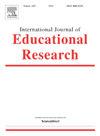Mobile-based assessment acceptance: A systematic literature review in the educational context
IF 2.5
3区 教育学
Q1 EDUCATION & EDUCATIONAL RESEARCH
引用次数: 0
Abstract
In the digital transition that educational systems face today, changes in assessment processes and the use of mobile devices in classrooms are two of the main challenges for educational institutions. In this context, mobile-based assessment has become one of the essential fields in this new technology-mediated reality. A systematic literature review was conducted in nine databases to gather all the research focused on mobile-based assessment acceptance through eleven search strings with the most widely applied acceptance models in education. After obtaining 1,881 results and applying five exclusion and ten quality criteria, 15 publications focusing on this acceptance were obtained. The results show the initial state of the field, with most of its lines of research still to be explored. So far, the current acceptance models identified after the systematic literature review are primarily based on the Technology Acceptance Model in research conducted mainly with Higher Education students. This review has provided the field's current state, the analysis of the actual models, and the future challenges to place mobile-based assessment as a quality element in 21st-century educational systems. Future research may focus on active teachers or focus on other educational levels, identifying the relevant dimensions of the technology acceptance in each context, and proposing a general validated model.
基于移动的评估接受:在教育背景下的系统文献综述
在当今教育系统面临的数字化转型中,评估过程的变化和教室中移动设备的使用是教育机构面临的两个主要挑战。在这种背景下,基于移动设备的评估已经成为这个以技术为媒介的新现实的重要领域之一。通过对教育中应用最广泛的接受模型的11个搜索字符串,对9个数据库进行了系统的文献综述,收集了所有关于基于移动的评估接受的研究。在获得1881个结果并应用5个排除标准和10个质量标准后,获得了15篇关注这一接受度的出版物。结果显示了该领域的初始状态,其大部分研究方向仍有待探索。到目前为止,经过系统的文献综述,目前的接受模型主要是基于技术接受模型,主要是针对高等教育学生进行的研究。本综述提供了该领域的现状,对实际模型的分析,以及将基于移动的评估作为21世纪教育系统质量要素的未来挑战。未来的研究可能会关注在职教师或关注其他教育层面,确定每种情境下技术接受的相关维度,并提出一个通用的验证模型。
本文章由计算机程序翻译,如有差异,请以英文原文为准。
求助全文
约1分钟内获得全文
求助全文
来源期刊

International Journal of Educational Research
EDUCATION & EDUCATIONAL RESEARCH-
CiteScore
6.20
自引率
3.10%
发文量
141
审稿时长
21 days
期刊介绍:
The International Journal of Educational Research publishes regular papers and special issues on specific topics of interest to international audiences of educational researchers. Examples of recent Special Issues published in the journal illustrate the breadth of topics that have be included in the journal: Students Perspectives on Learning Environments, Social, Motivational and Emotional Aspects of Learning Disabilities, Epistemological Beliefs and Domain, Analyzing Mathematics Classroom Cultures and Practices, and Music Education: A site for collaborative creativity.
 求助内容:
求助内容: 应助结果提醒方式:
应助结果提醒方式:


